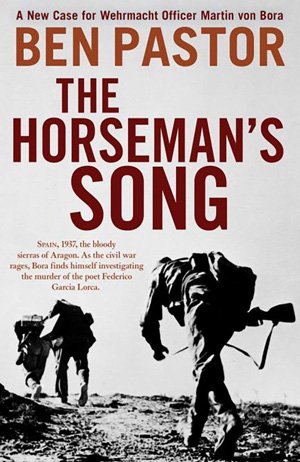
Written by Ben Pastor — This book, which has its first UK publication in 2019, is one of Ben Pastor’s six detective stories featuring German intelligence officer Martin Bora and a prequel to the novels covering Bora’s activities during World War II.
As the book opens, it’s summer 1937, in the midst of the Spanish Civil War. Two tiny encampments located high in the rocky sierras of Aragon overlook a valley, a cane-lined brook, and the small town of Teruel. Bora heads one of these camps, comprising about seven Nationalists. The other, near enough for occasional sniper-fire, is similarly sized and led by American volunteer Philip Walton. Walton is a World War I veteran, a couple of decades older than Bora, and in the fight on the Republican side less because of conviction and more because he can’t think of anything better to do.
The rest of the men are a ragtag bunch and prone to following their own inclinations than their orders. Neither unit is interested in an assault on the other, preferring to save their energies for a big battle rumoured to be coming soon. How near these two encampments are is illustrated by the fact that both Bora and Walton both visit the same prostitute high on the mountaintop. For Bora, the encounters with this young woman are life-changing; for Walton, they’re a painful reminder he’s ageing. For both, they inspire destructive sexual jealousy.
Bora finds the body of a man shot in the head on the road below his encampment and wonders how the man, whom he does not know, came there. Walton also knows about the corpse, plus he knows the dead man’s identity. It’s his friend Federico García Lorca, the revered poet and playwright, homosexual and staunch Republican. Walton and his men transport García Lorca’s body partway up the mountain and bury it, piling it with the ever-present rocks. Bora’s scouts find the grave, remove the body, and bury it elsewhere. The official story – in the novel as well as in real life – is that García Lorca was murdered in 1936 outside Granada. The authorities on both sides would prefer that Bora and Walton keep quiet about the murder and let the official story stand.
Separately, they each conduct a somewhat clandestine, rather slow-moving investigation of the events of the fatal night and the motives of various people who might have been involved. It’s slow going because Walton and Bora are engaged in many other activities. Bora must report to his Abwehr superior in Teruel and deal with the local colonel in the Spanish army. Walton is occupied with his fiery-tempered mistress Marypaz and a rash of petty thefts in the Republican camp.
The times themselves put a further damper on progress. If Bora wants to send a message to Teruel, someone has to get on a donkey and take it. A response won’t arrive for hours. If Walton wants to investigate an event in the village of Castellar, he must climb the mountain to do so. Although they receive occasional drenching rains, the overall impression of this hostile environment is that it’s dusty and hot, hot, hot. Author Pastor does an admirable job evoking the landscape, the conditions, and the way things got done eight decades ago. It seems both leaders have pieces of the puzzle, yet the full explanation eludes them.
With the murder investigation limping along, there is ample opportunity to explore the characters of both Walton and Bora, as well as several of their underlings. Pastor’s writing style is dense and full of psychological insight. She writes in short scenes that feel almost like hour-by-hour bulletins on camp activities. And, of course, writing about García Lorca gives the opportunity for pithy epigrams from his poems, like this one that aptly describes his own fate:
“Neighbors” I asked, “Where is my grave?”
“In my tail,” said the sun.
“In my throat,” said the moon.
Ben Pastor is the pseudonym for Maria Verbena Volpi. She was born in Rome and holds dual citizenship in Italy and the United States. She has written a number of historical novels and in 2008 won the Premerio Zaragoza prize for best historical fiction. Though her character Martin Bora is fictional, he was inspired by Claus von Stauffenberg, best known for his leading role in the July 1944 attempt to assassinate Adolf Hitler.
See also the works of the late Philip Kerr. A recent thriller involving an escape from Paris a hair’s-breadth ahead of the Nazis is Kirby Williams’s The Long Road from Paris.
Bitter Lemon Press
Print;Kindle
£5.01
CFL Rating: 4 Stars









